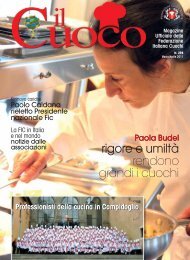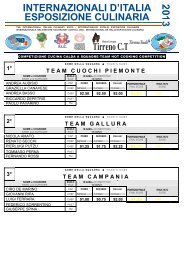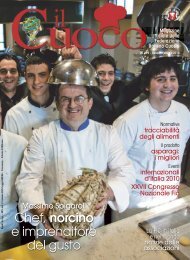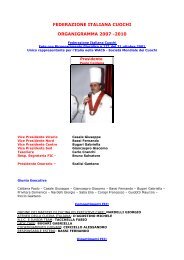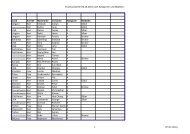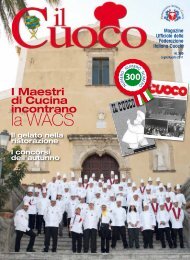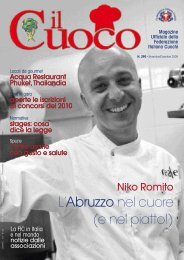Scarica versione PDF - Federazione Italiana Cuochi
Scarica versione PDF - Federazione Italiana Cuochi
Scarica versione PDF - Federazione Italiana Cuochi
You also want an ePaper? Increase the reach of your titles
YUMPU automatically turns print PDFs into web optimized ePapers that Google loves.
ILCUOCOINTERNATIONAL<br />
cholesterol cause arteriosclerosis; cholesterol<br />
mainly damages the heart, the brain and<br />
the kidneys, while triglycerides are mainly localised<br />
in the arteries of the legs and the retina.<br />
Fructose passes directly from the intestine<br />
to the liver without producing triglycerides.<br />
80|<br />
SEE PAGE 35<br />
FOR THE ITALIAN TEXT<br />
The ATENEO<br />
The Ateneo della Cucina <strong>Italiana</strong> is the<br />
professional updating school of the FIC.<br />
It was founded as a cultural and gastronomic<br />
venture aimed at fostering the development<br />
of professionals in line with<br />
the current needs of the catering world.<br />
Able to develop balanced analyses, to design,<br />
listen to and spread the millenary<br />
culture of Italian cooking. The Ateneo<br />
della Cucina <strong>Italiana</strong> has various headquarters<br />
for courses in Italy (see on the<br />
site www.fic.it) and also organises lessons<br />
and refresher courses abroad, for FIC delegations<br />
and for cultural organisations<br />
which request them.<br />
SEE PAGE 50<br />
FOR THE ITALIAN TEXT<br />
The identity<br />
of professional<br />
institutes<br />
By Giovanni<br />
Guadagno<br />
teacher of practical<br />
techniques<br />
On these pages, a journey begins through the<br />
red tape of educational reform. In particular,<br />
we present and comment on the “Guidelines for<br />
the transition to the new system” relating to professional<br />
Institutes (D.P.R. 15 March 2010, no.<br />
87 art. 8 paragraph 6). In bold print, we highlight<br />
the thoughts and consideration of the author<br />
of this article. What do you think about it?<br />
Write to me: chef.guadagno@alice.it<br />
“The re-organisation of professional in-<br />
stitutes responds to the need to organise fiveyear<br />
training paths, aimed at obtaining an educational<br />
certificate, based on a solid basis<br />
of general and technical-professional education<br />
referring to the production chains of<br />
national importance which at a local level can<br />
assume specific connotations.<br />
The new professional institutes are characterised<br />
by a priority reference to the large<br />
sectors in which the national economic system<br />
is structured, distinguished by technological<br />
and organisational applications which,<br />
in relation to the reference chain, can be listed<br />
on the basis of the vocation of the area, local<br />
development projects and the relevant<br />
training requirements.<br />
The distinctive elements which characterise<br />
the policies of professional education<br />
within the secondary education system is<br />
based, therefore, on the use of technologies<br />
and methods typical of the various application<br />
contexts; on the capacity to respond effectively<br />
to the growing demand for personalisation<br />
of products and services, which is at<br />
the basis of the success of many small and<br />
medium-size made in Italy companies; on a<br />
work culture which is based on interaction<br />
with local production systems and which requires<br />
the acquisition of a versatile scientific,<br />
technological and economic learning base.<br />
Integration with the local area and the production<br />
world is not only a work method, it<br />
is an unavoidable factor for combining the<br />
teaching plans of the school with local development<br />
plans and the training needs of the<br />
students are those offered by teaching and organisational<br />
autonomy, enriched by the opportunities<br />
put at the disposal of schools by<br />
the re-organisation rules.<br />
In recent years we have seen a general<br />
de-professionalization. We need good<br />
chefs, waiters and operators in the tourist<br />
sector. Let us stop deceiving our children<br />
with the allurement of degrees and<br />
doctorates of social prestige, sentencing<br />
them to mediocrity and low salaries.<br />
Three key words can help summarise the<br />
project references to structure the training<br />
offer in order to respond to a wide range of<br />
needs: : minds of work, professionalism and<br />
laboratoriality. The image of minds of work<br />
refers, on one hand, to the extraordinary tradition<br />
of initiative and intelligence of the Italian<br />
“molecular business”, on the other<br />
hand the principle of training equivalence of<br />
all the paths of the new system of the second<br />
cycle of the education and training system.<br />
It is founded on a cultural conception which<br />
intends overcoming the stereotypes of a sequential<br />
interpretation in the relationship between<br />
theory and practice and of the superiority<br />
of theoretical knowledge and offers<br />
structured answers to the questions of the<br />
world of employment and the professions. In<br />
designing the paths, for example, this approach<br />
urges the attention of teachers to correlate<br />
the solid basis of general and technical-professional<br />
education with the interests<br />
and motivations of the students, so that the<br />
subjects learned are perceived as useful, significant<br />
and verifiable in real life”.<br />
If there’s no work. Invent it! We don’t<br />
have any alternatives. Italy contains more<br />
than 50% of the world’s cultural heritage<br />
and is potentially able to live off<br />
tourism and its allied industries (agricultural<br />
production first of all), as long<br />
as we don’t sell the family jewels to the<br />
highest bidder and we don’t force our young<br />
people to leave lucrative jobs which<br />
are indispensable to the national economy<br />
(agriculture and stock breeding, the<br />
whole hospitality and catering sector) to<br />
follow the butterflies of finance.<br />
Professionalism proposes a valorisation of<br />
the work culture, understood in its widest<br />
meaning: the series of operations, procedures,<br />
symbols, languages and values, but also<br />
identity and sense of belonging to a<br />
professional community, which reflects an<br />
ethical vision of reality, a way of acting for<br />
positive purposes in relation to not only personal<br />
but also common needs.<br />
With the concept of laboratoriality the value<br />
of work extends to the purpose of the study<br />
path (learning to work), to the privileged<br />
method which allows students to<br />
learn in an active, absorbing, significant and<br />
effective way (learning while working).<br />
The reform puts all its cards on laboratory<br />
teaching which, unlike the old<br />
way of thinking, is not valid only and<br />
above all for the main subjects. Each<br />
teacher and each subject can develop<br />
this type of teaching, within the limits of<br />
their need. The aim is not that of producing<br />
meals, pizzas, newspaper articles<br />
rather than translations into foreign languages,<br />
but it is that of concentrating the<br />
attention on the improvements which<br />
the pupil brings to his work by forcing<br />
him not to work in a hurry but above all<br />
to learn to work well.<br />
To correspond to this vision and to become<br />
true “schools of territorial innovation”,<br />
the professional institutes are called open




